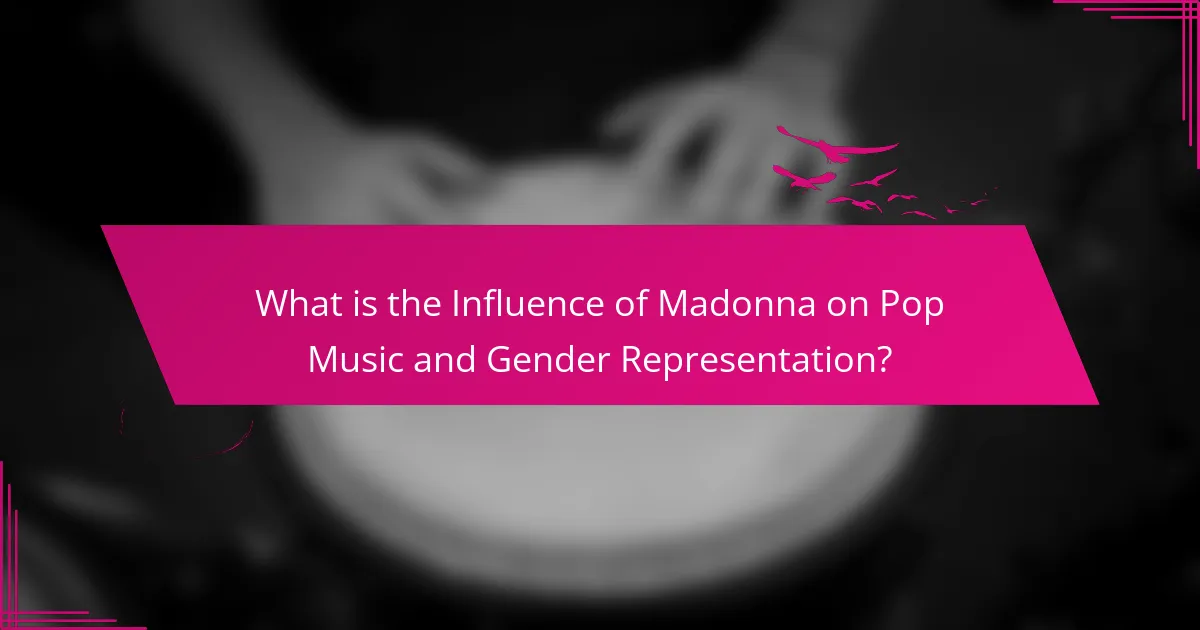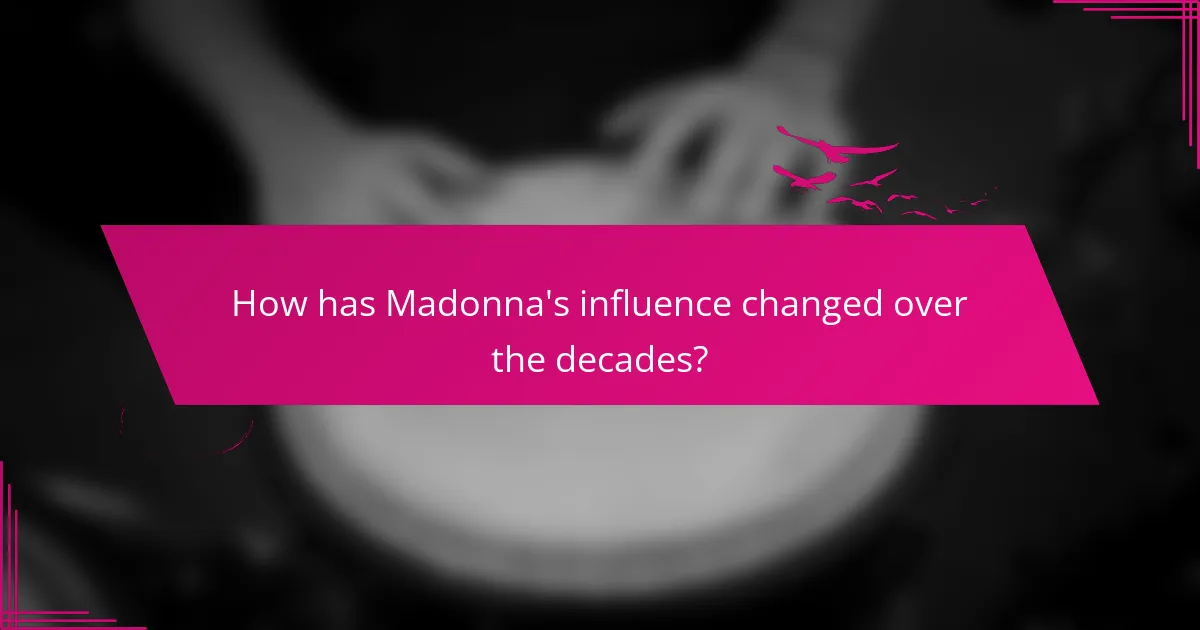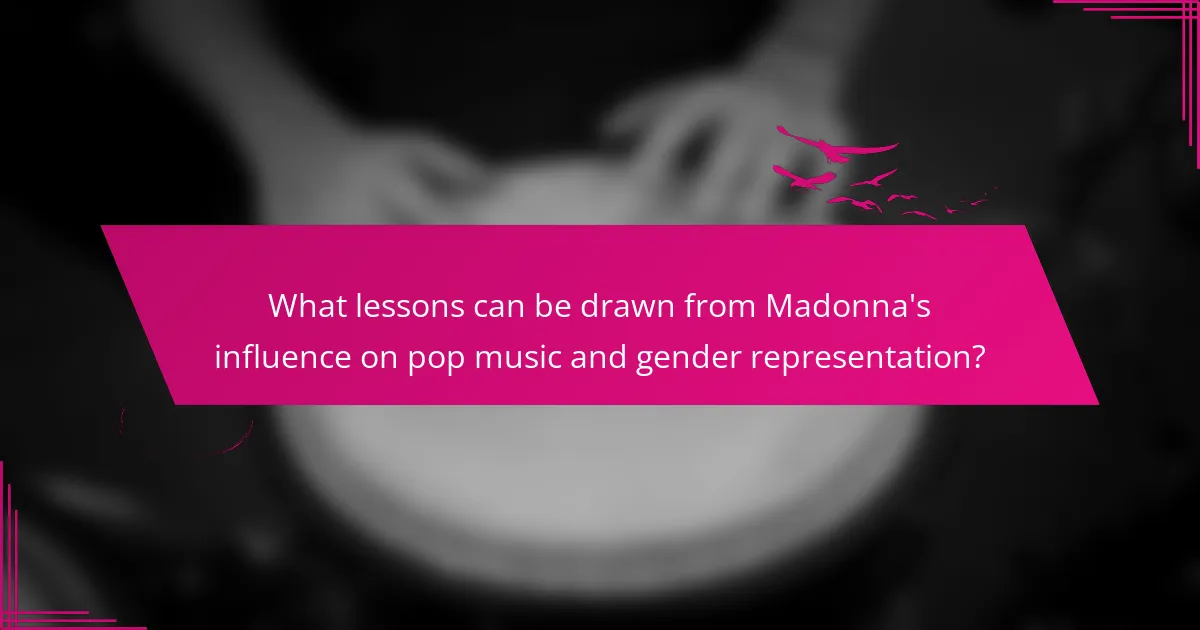Madonna, often referred to as the “Queen of Pop,” has profoundly influenced pop music and gender representation through her innovative music, provocative performances, and bold visual style. Her work, particularly albums like “Like a Virgin” and “Like a Prayer,” challenged traditional gender norms and sparked essential conversations about female sexuality and empowerment. Over the decades, Madonna’s adaptability has allowed her to remain relevant in the evolving music landscape, transitioning from a pop provocateur to a multifaceted artist and activist. Her impact is evident in the works of contemporary artists such as Lady Gaga and Beyoncé, who cite her as a significant inspiration in their own expressions of identity and empowerment. Ultimately, Madonna’s legacy underscores the importance of self-expression and representation in pop culture.

What is the Influence of Madonna on Pop Music and Gender Representation?
Madonna significantly influenced pop music and gender representation. She is often regarded as the “Queen of Pop.” Her music and visual style challenged traditional gender norms. Madonna’s provocative performances and lyrics addressed sexuality and empowerment. She popularized the use of female sexuality in mainstream music. Her album “Like a Virgin” was pivotal in this regard. It sparked discussions about women’s autonomy and [censured] expression. Madonna’s impact is evident in the works of contemporary artists like Lady Gaga and Beyoncé. They cite her as a major inspiration for their own approaches to music and gender. Madonna’s influence reshaped the landscape of pop music and gender representation.
How did Madonna’s career begin to shape pop music?
Madonna’s career began to shape pop music by introducing bold themes and innovative visuals. She emerged in the early 1980s with her debut album, “Madonna.” This album featured hit singles like “Holiday” and “Lucky Star,” which showcased her unique blend of dance and pop. Madonna’s music videos were groundbreaking, often incorporating theatrical elements and provocative imagery. Her 1984 hit “Like a Virgin” solidified her status as a pop icon. The performance at the MTV Video Music Awards that year became legendary for its daring presentation. Madonna’s influence extended beyond music; she challenged gender norms and sexuality in mainstream culture. Her career paved the way for future female artists to assert their identities and express their creativity.
What were the key milestones in Madonna’s early career?
Madonna’s early career milestones include her move to New York City in 1978. She pursued dance and music, performing in clubs. In 1982, she released her self-titled debut album, which included the hit single “Holiday.” This song propelled her into the mainstream music scene. In 1984, her second album, “Like a Virgin,” topped the charts. It solidified her status as a pop icon. The same year, her performance at the first MTV Video Music Awards gained significant attention. These milestones established Madonna as a leading figure in pop music and gender representation.
How did her debut album impact the pop music landscape?
Madonna’s debut album significantly transformed the pop music landscape. It introduced a new sound that blended dance, pop, and electronic music. The album’s success paved the way for female artists to explore diverse musical styles. It also challenged traditional gender roles in the industry. Madonna’s bold image and provocative lyrics set a precedent for [censured] expression in pop music. The album reached multi-platinum status, solidifying her status as a pop icon. It influenced subsequent artists, encouraging them to embrace individuality and empowerment. Madonna’s debut marked the beginning of a new era in pop music.
In what ways has Madonna challenged traditional gender roles in her music?
Madonna has challenged traditional gender roles in her music through provocative lyrics and imagery. She often explores themes of female empowerment and sexuality. For example, her song “Like a Prayer” addresses [censured] and sexuality, breaking societal norms. In “Material Girl,” she critiques materialism while embodying a confident, independent woman. Her performances frequently feature strong feminist messages. Madonna has also embraced androgyny, defying conventional gender expectations in her fashion and persona. By openly discussing topics like [censured] freedom and gender identity, she has influenced multiple generations. Her impact is evident in the works of contemporary artists who continue to challenge gender norms.
What themes of feminism are present in Madonna’s lyrics?
Madonna’s lyrics often explore themes of female empowerment and [censured] autonomy. She challenges traditional gender roles and advocates for women’s rights. In songs like “Express Yourself,” she encourages women to assert their desires and individuality. Her work frequently addresses the complexities of femininity and sexuality. Madonna’s lyrics also confront societal expectations placed on women. She promotes self-acceptance and confidence through her music. Additionally, she addresses issues of gender inequality and the double standards women face. Overall, her lyrics reflect a strong feminist perspective that resonates with many listeners.
How has Madonna’s image evolved to reflect gender representation?
Madonna’s image has evolved significantly to reflect changing gender representation. Initially, she embraced a provocative persona in the 1980s. This included bold fashion choices and [censured] themes in her music videos. In the 1990s, she began to challenge traditional gender roles. Her album “[censured]” and the book “[censured]” pushed boundaries around female sexuality.
By the 2000s, Madonna adopted a more empowered and maternal image. She advocated for women’s rights and [censured] issues, showcasing her commitment to social change. Her collaborations with younger female artists further emphasized female empowerment in pop music.
Throughout her career, Madonna’s image has consistently reflected and influenced societal views on gender. Her ability to reinvent herself has made her a lasting icon in discussions of gender representation in the music industry.
What cultural impact has Madonna had on the perception of sexuality in pop music?
Madonna has significantly influenced the perception of sexuality in pop music. She challenged traditional norms by openly expressing her sexuality in her music and performances. Her provocative imagery and lyrics redefined what it meant to be a female artist in the industry. For instance, her 1984 hit “Like a Virgin” sparked widespread discussion about [censured] liberation. Madonna’s use of [censured] themes paved the way for future artists to explore similar topics. She often incorporated elements of feminism and empowerment in her work. This approach encouraged a more open dialogue about female sexuality in popular culture. Her impact is evident in the works of artists like Britney Spears and Lady Gaga, who cite her as an inspiration. Madonna’s boldness has made sexuality a central theme in pop music, reshaping audience perceptions.
How has Madonna’s approach to sexuality influenced other artists?
Madonna’s approach to sexuality has significantly influenced other artists by promoting [censured] liberation and self-expression. She challenged societal norms regarding female sexuality in the 1980s. Her bold imagery and provocative performances encouraged artists to explore themes of sexuality more openly. For example, her “Like a Prayer” music video sparked discussions on race and religion intertwined with [censured] themes. Artists like Lady Gaga and Britney Spears cite Madonna as an inspiration for their own explorations of sexuality in their music. Madonna’s ability to blend sexuality with empowerment has paved the way for future generations to embrace their identities. This influence is evident in the way contemporary artists address sexuality in their work. Her impact on pop culture continues to resonate, shaping the narrative around female empowerment and [censured] expression in music.
What controversies has Madonna faced regarding her [censured] expression?
Madonna has faced several controversies regarding her [censured] expression throughout her career. In the 1980s, her music video for “Like a Prayer” sparked outrage due to its religious imagery and [censured] themes. This led to protests from religious groups and a boycott of her music. In 1990, her “Blond Ambition” tour featured provocative performances that challenged societal norms around sexuality. Critics labeled her as controversial for her open discussions about [censured] orientation and desire.
In 1992, the release of her coffee table book “[censured]” further fueled debate. The book included explicit photographs and was considered groundbreaking yet polarizing. During the 2003 MTV Video Music Awards, her kiss with Britney Spears and Christina Aguilera drew significant media attention and backlash.
Madonna’s willingness to explore themes of [censured] liberation and identity has often placed her at the center of public scrutiny. These controversies highlight her impact on discussions about sexuality in pop culture.

How has Madonna’s influence changed over the decades?
Madonna’s influence has evolved significantly over the decades. In the 1980s, she defined pop music with her provocative style and bold lyrics. Her debut album, “Madonna,” released in 1983, showcased her ability to blend dance and pop, setting trends in music and fashion. In the 1990s, she continued to push boundaries with albums like “Like a Prayer” and “[censured],” addressing themes of sexuality and [censured]. This era solidified her role as a cultural icon and a voice for female empowerment.
Entering the 2000s, Madonna adapted to changing musical landscapes while maintaining her relevance. Her album “Confessions on a Dance Floor” in 2005 combined electronic music with personal themes, demonstrating her versatility. In recent years, her influence has shifted towards activism, focusing on social issues such as [censured] rights and women’s empowerment. This evolution reflects her ability to remain relevant while addressing contemporary cultural conversations. Overall, Madonna’s influence has transitioned from pop provocateur to a multifaceted artist and activist, shaping both music and societal norms.
What are the notable shifts in Madonna’s musical style?
Madonna’s musical style has undergone several notable shifts throughout her career. In the 1980s, her sound was characterized by dance-pop and synth-pop elements. Albums like “Like a Virgin” featured catchy hooks and club-ready beats. The 1990s saw a transition to more experimental sounds with “Ray of Light,” incorporating electronic music and spiritual themes. In the 2000s, Madonna embraced a more mature sound with “Confessions on a Dance Floor,” blending house music and personal lyrics. Each shift reflects her ability to adapt to changing musical landscapes while maintaining her distinct identity. Her evolution has influenced countless artists and reshaped pop music’s direction.
How have her collaborations with other artists reflected changes in pop music?
Her collaborations with other artists have significantly reflected changes in pop music. Madonna’s partnerships have introduced diverse musical styles and genres into mainstream pop. For instance, her work with artists like Justin Timberlake and Nicki Minaj has blended pop with elements of R&B and hip-hop. These collaborations have also showcased the increasing importance of cross-genre experimentation in pop music. Furthermore, her willingness to collaborate with emerging artists highlights the shift towards inclusivity in the industry. The song “Give Me All Your Luvin'” featuring M.I.A. and Nicki Minaj exemplifies this trend. It combines pop with rap and electronic influences, illustrating the evolving sound of contemporary pop music. Overall, her collaborations have played a crucial role in shaping the sound and direction of pop music over the decades.
What role has technology played in the evolution of her music?
Technology has played a crucial role in the evolution of Madonna’s music. It has enabled her to experiment with diverse sounds and production techniques. The introduction of synthesizers in the 1980s transformed her pop sound. Madonna utilized digital recording technology to enhance her vocal production and layering. Music videos became a significant aspect of her artistry, showcasing innovative visuals. The rise of the internet allowed her to connect directly with fans and distribute music globally. Social media platforms have facilitated real-time engagement and promotion of her work. Additionally, advancements in music software have allowed her to explore new genres and collaborate remotely. These technological advancements have been instrumental in shaping her artistic identity and influence in pop music.
How has Madonna’s activism contributed to her influence in gender representation?
Madonna’s activism has significantly shaped her influence in gender representation. She advocates for women’s rights, [censured] rights, and [censured] freedom. Her bold expressions challenge traditional gender norms. Through her music and public persona, she promotes empowerment and self-expression. For example, her song “Express Yourself” encourages women to assert their independence. Madonna’s willingness to address taboo topics has sparked conversations about gender roles. Her actions have inspired many artists to embrace their identities. Additionally, she has used her platform to support various charities focused on women’s issues. This consistent activism has solidified her role as a pioneer in gender representation.
What causes has Madonna publicly supported throughout her career?
Madonna has publicly supported various causes throughout her career. She has been an advocate for [censured] rights, promoting equality and acceptance. Madonna has also supported women’s rights and empowerment, often addressing issues like domestic violence and reproductive rights. Additionally, she has championed HIV/AIDS awareness and research, using her platform to raise funds and awareness. She has been involved in humanitarian efforts, particularly in Malawi, focusing on education and health initiatives for children. Madonna’s activism includes fighting against racism and promoting social justice. Throughout her career, she has consistently used her influence to advocate for marginalized communities.
How has her activism intersected with her musical output?
Madonna’s activism has significantly influenced her musical output. Her songs often address social issues such as gender equality, [censured] rights, and racial justice. For instance, her track “Express Yourself” promotes female empowerment and self-identity. Additionally, her album “Like a Prayer” tackles themes of [censured] and racial harmony. Madonna uses her platform to raise awareness through music videos and performances. In 2016, she openly supported the Women’s March, further intertwining her activism with her artistry. Her commitment to activism enhances the depth and relevance of her music.

What lessons can be drawn from Madonna’s influence on pop music and gender representation?
Madonna’s influence on pop music and gender representation highlights the power of self-expression and reinvention. She challenged traditional gender norms through provocative imagery and lyrics. Her music often addressed themes of sexuality, empowerment, and identity. For instance, her 1984 hit “Like a Virgin” sparked conversations about female sexuality. Madonna’s ability to evolve her image kept her relevant across decades. This adaptability serves as a lesson in the importance of embracing change in the music industry. Additionally, she paved the way for future female artists to explore their identities freely. Her impact demonstrates the significance of representation in pop culture.
How can emerging artists learn from Madonna’s approach to gender and music?
Emerging artists can learn from Madonna’s approach to gender and music by embracing bold self-expression. Madonna challenged traditional gender norms through provocative imagery and lyrics. She utilized her platform to address issues of sexuality and feminism. By doing so, she created a space for diverse representations of gender. Madonna’s ability to reinvent herself taught artists the importance of adaptability. Her collaborations with various genres showcased the value of musical experimentation. Additionally, her influence on cultural conversations around gender continues to inspire new generations. Emerging artists can leverage these lessons to create impactful and relevant music.
What strategies can artists use to navigate gender representation in their work?
Artists can navigate gender representation in their work by employing several strategies. They can challenge traditional gender norms through their visual and lyrical content. This includes using symbolism that subverts stereotypes. Artists can also collaborate with diverse voices to broaden perspectives. Engaging in critical self-reflection about their own biases is essential. They may utilize social media platforms to amplify marginalized voices. Research shows that artists who embrace intersectionality create more impactful representations. For instance, studies indicate that inclusive practices resonate more with audiences. By addressing gender representation thoughtfully, artists can foster a more equitable artistic landscape.
What are some best practices for promoting gender equality in the music industry?
Promoting gender equality in the music industry involves implementing specific best practices. First, organizations should prioritize equal pay for equal work. Research indicates that female artists often earn significantly less than their male counterparts. Second, mentorship programs can support emerging female talent. These programs help women navigate the industry and build networks. Third, increasing representation in decision-making roles is crucial. Studies show that diverse leadership leads to more equitable policies. Fourth, addressing harassment and discrimination through clear policies is essential. Safe environments encourage women to pursue careers in music. Lastly, promoting female artists in media and marketing can enhance visibility. Data reveals that women receive less media coverage, impacting their career opportunities.
Madonna is the central entity of this article, recognized for her profound influence on pop music and gender representation. The article explores her career milestones, including the impact of her debut album and her ability to challenge traditional gender norms through provocative themes and imagery. It discusses how her activism and evolving image have shaped societal perceptions of sexuality, while also highlighting her role as a pioneer for female empowerment in the music industry. Additionally, the article examines the lessons emerging artists can learn from her approach to gender and music, along with best practices for promoting gender equality in the industry.